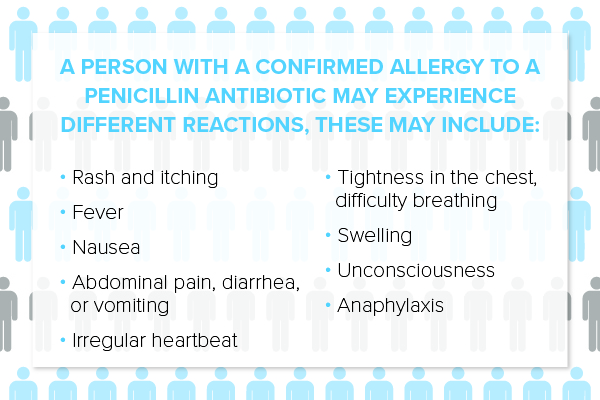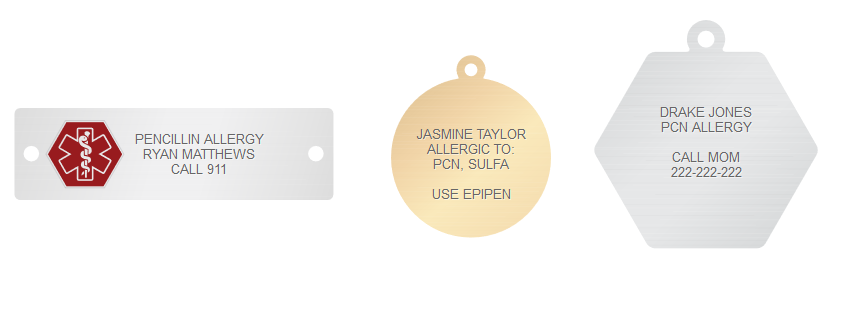

Medical IDs for Penicillin Allergy
According to the World Allergy Association, penicillin, aspirin, and sulfonamides account for over 80 percent of allergic drug reactions worldwide. Approximately 1 to 3 percent of patient courses of penicillin are complicated by allergic reactions.
What is Penicillin?
Penicillin is a widely used antibiotics that is effective against common bacterial infections. Up to 10 percent of people report being allergic to penicillin. A person with a confirmed allergy to a penicillin antibiotic may experience different reactions that can range from mild to severe, and occur immediately or gradually after taking the drug. Some of these reactions could be:
- Rash and itching
- Fever
- Nausea
- Abdominal pain, diarrhea, or vomiting
- Irregular heartbeat
- Tightness in the chest, difficulty breathing
- Swelling
- Unconsciousness
- Anaphylaxis
Penicillin is the most common cause of anaphylaxis. It can occur minutes after taking the drug and can be fatal if not treated right away. Anaphylaxis requires an immediate epinephrine injection and hospital care to maintain blood pressure and support breathing.
"As a child I grew up with a few health issues, one being major digestive issues. I would have to be force fed antibiotics because every time I would take an antibiotic, like penicillin, it would make me vomit, give me uncomfortable rashes, cause horrible stomach pains, fevers and so forth. Being so young I couldn't always communicate when something wasn't right with my body. Trying one medication after another my parents quickly learned that I was allergic to many types of antibiotics, particularly those in the penicillin family.
The side effects of my allergies to medications were severe and made an impact on my life as an adult navigating my health. Now, I care for my health through holistic remedies to prevent the usage of antibiotics. Being proactive for my health instead of reactive has helped me navigate through life without antibiotics for over 5 years. Penicillin is one of the top drugs used to fight off infection, which is why I always wear or carry my medical ID. I know if there is a time that I am unable to state all my allergies for myself, the ID is there to protect me and my well-being. Be an advocate for your own health and take advantage of tools like Universal Medical ID to protect yourself." - Stefanie Rodrigues, Holistic Life Coach at One Pace Holistic Health
Communicating Penicillin Allergy in an Emergency
Prompt diagnosis is vital for drug hypersensitivity such as an allergic reaction to penicillin. A medical alert ID can help in emergencies when timely identification and early withdrawal of a suspected drug can be vital. It can also help avoid exposure and re-exposure to the offending penicillin medicine.
Information about a person’s allergy to antibiotics can save a life. A study shows that surgical site infection was found to be 50 percent higher in patients with a reported penicillin allergy. This why people who are allergic to penicillin are recommended to inform medical providers before being administered treatment. A medical ID bracelet or necklace can speak for you in emergencies when you may be unconscious or unable to.
If an allergist or immunologist recommends that a person carries allergy treatment or supplies like an epinephrine autoinjector or epi pen, information on the epi pen's location such as it being inside a bag or pocket can be included on a custom-engraved medical alert bracelet or necklace.


What to Engrave on a Penicillin Allergy Medical ID
The effectiveness of a medical ID depends on the accuracy of its engraving. A custom engraved medical ID tag, charm, or pendant makes it possible to engrave a person’s unique set of allergies, medical conditions, and emergency contacts. It is recommended that a medical ID contain the at least the following important information:
- Your name to quickly identify yourself
- Your drug allergies such as an allergy to penicillin and/or related medications, and other medical conditions that you may have. Note: An allergy to penicillin might mean having to avoid all drugs in the immediate penicillin family such as amoxicillin, for example. Ask your allergist or immunologist for advice if other types of drugs need to be engraved on your medical ID.
- Your emergency contacts or a prompt to call emergency services
A general concern about engraving a medical ID is fitting all medical information on a medical ID plate or tag. Nowadays, medical ID tags come in different styles, shapes, and sizes. Each can hold different lengths of engraved information. The commonly used abbreviation for penicillin is PCN, for others see our guide on medical ID engraving. Here are a few engraving examples:


Important reminder: Only wear a penicillin allergy medical alert jewellery after a confirmed diagnosis such as from positive penicillin challenge or allergy testing. A misdiagnosed penicillin allergy may result in the use of less-appropriate or more-expensive antibiotics without penicillin. Please consult your doctor or allergist for more information.


“I wasn’t diagnosed with a penicillin allergy until my mid-20s... I randomly broke out in a head to toe rash a few days into treatment and was told to immediately stop the antibiotic. Due to the severity of my rash, my doctor said he was unsure how I would react if I was exposed again and that I needed to avoid penicillin and other related antibiotic derivatives going forward. Being a type 1 diabetic too, I know there is a risk that I could lose consciousness at some point, so it’s important for me to have both my diabetes info and my allergy information on my medical ID.” - Mary Ellen Phipps, MPH, RDN, LD at Milk and Honey Nutrition

 - US
- US  - Canada
- Canada  - Australia
- Australia 
